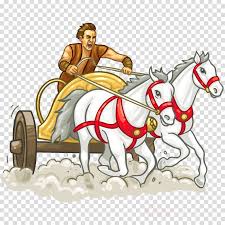Joshua 11:1-3 – When Jabin, king of Hazor, heard of this, he sent to Jobab king of Madon, and to the king of Shimron, and to the king of Achshaphand to the kings who were in the northern hill country, and in the Arabah south of Chinneroth, and in the lowland, and in Naphoth-dor on the west to the Canaanites in the east and the west, the Amorites, the Hittites, the Perizzites, and the Jebusites in the hill country, and the Hivites under Hermon in the land of Mizpah.
Welcome back, dear readers! We are studying the book of Joshua, which relates the story of how Israel took the Promised Land – the territory of Canaan.

Keep in mind that Canaan was not a nation united under one king or central government. Instead, it was a conglomeration of small kingdom cities, each with its own ruler, its own military and its own agenda. These small kingdoms often fought against each other for various reasons. Nevertheless, they agreed to join together for the purpose of defeating their common enemy.
The church could learn a lesson from this confederacy – now is a good time for Christians of all denominations and classes to put our minor differences aside and unite against our common enemy, Satan.
In chapter 10, we found an alliance of five kingdoms led by Adoni-zedek, king of Jerusalem. The kingdoms of this alliance were in the southern regions of the Promised Land, near the city Jebus, which would later be named Jerusalem. This alliance of nations was utterly destroyed by Israel.
In chapter 11 we find a very similar narrative. This time there is a confederacy of multiple kingdoms/nations led by Jabin, king of Hazor. The kingdoms of the confederacy were located in the northern regions of the Promised Land.
Jabin: As we have seen in other instances, 'Jabin' is not a name but a title that was used by the kings of Hazor. The word/title literally means 'he shall understand' and is equivalent to 'the wise' or 'intelligent'.
Hazor: 'Hazor' means 'enclosed' or 'fortified'. There were at least three cities in Canaan with this name. Two were located in the south and were part of the inheritance of Judah. However, the city involved in the confederacy of chapter 11 was a major city in the northern part of Canaan. It would later fall into the inheritance of the tribe of Napthtali (Joshua 19:36). It was believed to be the strongest fortress in the north.
Although Joshua will destroy and burn it to the ground (Joshua 11:11), it will eventually be rebuilt by the Canaanites and once again become a powerful center of government and military might� About 130 years after Joshua dies, we find another 'Jabin' sitting on the throne who kept Israel under slavery for twenty years before God rescued his people by the hands of Deborah and Barak (Judges 4 and 5).
At the time of the events recorded in Joshua, Hazor was powerful enough to have a number of smaller tributary cities/kingdoms under their control. These are the unnamed kingdoms referred to in verses 1-3. These may be the same kingdoms mentioned later in Joshua 12:9-24, where 31 different kings are mentioned.
So Jabin, upon learning of the defeat of the alliance led by Adoni-Zedek, forms a military confederacy of the northern nations. The purpose of the confederacy was the same as that of the defeated southern alliance – to subdue or destroy the children of Israel.
Joshua 11:4-5 – And they came out with all their troops, a great horde, in number like the sand that is on the seashore, with very many horses and chariots. And all these kings joined their forces and came and encamped together at the waters of Merom to fight against Israel.
The phrase 'the sand upon the sea shore' is a hyperbole often found in scripture. It conveys the idea of a vast number; far too many to actually count or even estimate. God himself uses this phrase when describing the number of descendants of Abraham:
Genesis 22:17 -That in blessing I will bless you, and in multiplying I will multiply your descendants as the stars of the heaven, and as the sand which is upon the seashore; and your descendants shall possess the gate of their enemies;
However, in this case it is used to describe the overwhelming number of troops that were coming against Israel.
We can conclude that the forces of the confederacy were not only greater in number, but they were better equipped and therefore much more formidable than those of the alliance. In addition to foot soldiers, they also had a cavalry and chariots – the ancient equivalent of an armored car!
Cavalry: Obviously, a soldier riding an enormous war horse has a big advantage in battle.According to the noted historian Josephus, the confederacy had 10,000 cavalry soldiers. Other historians tell us that Egypt supplied the Canaanites with these animals.
Chariots: The war chariots were probably like those of Egypt which were made of wood and tipped with iron. It has been reported that the chariots had forward facing, iron tipped spikes attached to the yokes of their horses. In addition, they were made with strongly fortified wheels and had iron scythes attached to poles projecting from the center of the wheel. As the chariot flew through the enemy ranks, these iron implements mortally wounded anyone who did not get out of the way.
Without the Lord on their side, the Israeli soldiers would certainly have been terrified, especially considering that their own army consisted entirely of foot soldiers.

All of Israel's previous battles had been fought man-to-man in the mountainous terrain near Jerusalem. The battle for the north, however, took place near water on a flat plain. This made it feasible for the enemy to use chariots. Scripture tells us the name of the lake was Merom, but it exact location is unknown.
Nevertheless, it is always good for the people of God to remember that even though the majority of us cannot see into the spiritual realm, we can be assured that those who are for us are greater than those who are against us (II Kings 6:16).
Joshua 11:6 – And the Lord said to Joshua, "Do not be afraid of them, for tomorrow at this time I will give over all of them, slain, to Israel. You shall hamstring their horses and burn their chariots with fire."
Before this epic battle, Joshua did not fail to stop and consult the Lord. God, in his great mercy, reassures Joshua that due to his intervention, Israel would once again be victorious over her enemies, just as he had promised:
Deuteronomy 20:1 -When you go out to battle against your enemies, and see horses, and chariots, and a people more than you, be not afraid of them: for the LORD your God is with you, who brought you up out of the land of Egypt.
Even though they enemy was to be slain by the swords of Israel, the scriptures give the credit to God; he was the one who delivered them into the hands of Israel.� Without his presence and protection, Israel would have been defeated.
We cannot help but notice that God reiterates his promises of victory to Joshua over and over and over again. Why does God do that?
He does it because our faith is in constant need of nourishment. If we regularly meditate on the past victories God has given to us personally, to the church and to our nation, it keeps our faith healthy and strong.
We can also feed our faith through testimonies. There can be no doubt that testimonies are extremely powerful in the spiritual realm. Scripture tells us that the combination of the blood of Jesus with the word of our testimony defeats our enemy, Satan:
Revelation 12:11 -And they overcame him by the blood of the Lamb, and by the word of their testimony; and they loved not their lives unto death.
Let me say it again: Your testimony is powerful! Open your mouth and proclaim what God has done for you! Doing so will prepare you for the next battle you face. It is also important that you share it with others because your testimony will feed their faith too. After all, if God has delivered you, he will do it for others as well!
God goes on to remind Joshua that two things must be done after the victory:
One, Israel was to hamstring the horses. This means that they were to cut the hamstring tendons in the thigh of the horse. Once severed, this sinew cannot be healed, so the horse would be lame or unable to walk/run properly.
Second, they are to not only destroy but burn all the enemy's chariots.
Why would God make Israel do that?

The answer is simple – because God did not want Israel to adopt the methods of warfare used by the heathen nations. If they became adept with these weapons, they would soon begin to trust in their own strength and power, which would eventually fail them. Victory for God's people can only come through depending on Him (Psalms 20:7).
Before we move on, let's discuss the word 'tomorrow'. In this verse God says that 'tomorrow' at the same time, he would give the enemy into Joshua's hands. We know that Hazor was approximately 60-80 miles from Gilgal, the base camp of Israel. Josephus tells us that Joshua spent five days traveling from Gilgal to the encampment of the kings.
So, either Joshua was already near to the enemy camp when God spoke to him, or the word 'tomorrow' is used in a general sense meaning soon or immediately.
Joshua 11:7 – So Joshua and all his warriors came suddenly against them by the waters of Merom and fell upon them.
Just as in the battle with the southern alliance, Israel catches the northern confederacy by surprise. They believed Israel was still miles away, but they suddenly appeared seemingly out of nowhere!
Israel caught them off guard while they were garrisoned between the mountains and the lake. Because of this position, the horses and chariots would not have had room to deploy effectively, and the confederacy had no time to organize them into a fighting position. Before they could do anything, Israel attacked.
Joshua 11:8 – And the Lord gave them into the hand of Israel, who struck them and chased them as far as Great Sidon and Misrephoth-maim, and eastward as far as the Valley of Mizpeh. And he struck them until he left none remaining.

First of all, we cannot overstate the hand of God in the conquest of the Promised Land. The kingdoms cities in Canaan were in close enough proximity that they could have solidified as a single fighting unit the minute that Israel crossed the Jordan.�But because of the influence of God, they didn't. Even Jericho, who was the first kingdom to fight the unknown invaders, did not request reinforcements from the other kingdoms.
After that miraculous victory, it could only have been the mercy and goodness of God which caused the Canaanites to form a southern alliance and a northern confederacy, dividing Israel's enemies so they could be defeated more easily.
Just as with the southern alliance, the slaughter of the northern confederacy was swift and sure. As the fighting intensified, the confederate soldiers turned and fled as fast as possible to one of two distant locations.
Some fled northwest to the metropolis of Sidon. In ancient times, Sidon was the capital city of Phoenicia. You may have read about this city other places in the scriptures. It is often mentioned in conjunction with its nearby neighbor, Tyre (Matthew 23:11, Mark 7:31, Luke 10:13-14, etc). Sidon is described as 'great', which refers to its wealth, its importance as a commercial/trading hub, and its overall size. As a well-fortified city, it was a logical place for the fleeing soldiers to seek refuge (or so they thought).
The scriptures indicate that survivors of the confederacy also fled to Misrephoth-maim. The location and significance of this city is unknown. The meaning of its name is 'burning waters'. This leads to speculation that the area was either a natural hot springs, or a place filled with ditches where salt was manufactured through the evaporation of water.
Despite their efforts to flee, the men of Israel continued to pursue and destroy their enemies until none were left. However, this was only because they had rejected the mercy of God.
The people of the northern confederacy had ample opportunities to surrender to Israel. But they rejected the chance to become proselytes and vassals/tributaries of Israel, where they could have experienced God's grace. Therefore, God delivered them into the hands of Israel who became his instruments of justice.
Other soldiers fled northeast to the valley of Mizpeh, but their efforts were also in vain.
Joshua 11:9 – And Joshua did to them just as the Lord said to him: he hamstrung their horses and burned their chariots with fire.
As previously mentioned, the confederacy was unable to use their horses or their chariots because of Israel's surprise attack. So, once they fled the battle in fear, Israel was free to enter their base camp, destroy their horses and burn their chariots.

Again, this was done according to the command of God, who did not want Israel to develop a trust in their own abilities; he wanted Israel to remain dependent on him for their military victories.
But it served another purpose as well - to teach Israel not to be afraid of man-made weapons/war implements. The disabled horses and charred chariots were clear evidence that no weapon of man could defeat the children of God, regardless of how formidable it may seem at first. For the children of Israel, seeing the destruction of the horses and chariots served the same purpose as putting their feet upon the necks of the five kings – it reminded them that no weapon formed against them could defeat the living God!
Isaiah 54:17 – No weapon that is fashioned against you shall succeed, and you shall refute every tongue that rises against you in judgment. This is the heritage of the servants of the Lord and their vindication is from me, declares the Lord.
The conquest of the Promised Land also demonstrates how God builds up or matures his people spiritually. When Israel first crossed into the Promised Land, their faith was not exceptionally strong. God used the smaller battles against Jericho and Ai to build up the faith of his people, so they could withstand the tests that were still to come.
The next war involved a much bigger enemy – the alliance of the five southern kings. Again, we see that God encouraged his people to go to war because he would be with them, just as he had in Jericho. Victory in this greater war caused Israel's faith to grow even stronger and deeper. Their fighting skills also increased at the same time.
It was only after this growth that they were in a position to take on the extremely formidable northern confederacy which had both cavalry and chariot divisions.
It has been observed that God proportions our trials to our strength and our strength to our trials. How true this is!
In other words, God trains his people in such a way that each battle the church faces makes us stronger and fuller of faith. This in turn sets us up for even greater victories for the kingdom of heaven. The same principle holds true in our personal lives as well.
So, the next time you encounter a battle, instead of thinking, 'why me', think, 'what is God doing in my life through this moment', because you can be sure he intends that battle to be for your good!
Let me offer you some encouragement and relief:
In this narrative, we find that the enemies of Israel were as numerous as the sand on the seashore. They were also better equipped and better trained. When looking at the situation from the natural point of view, Israel had every reason to be afraid of losing the battle – but they were victorious!
We know that God never sets us up to fail. If he brings you to a battle, he will never leave you; he will fight on your behalf just as he did for Israel.
Deuteronomy 31:8 – The Lord himself goes before you and will be with you; he will never leave you or forsake you.� Do not be afraid; do not be discouraged.
The key is that we must do our part. For example, suppose there was an issue with your local school board. Suppose they decided to adopt a practice that was completely against the word of God.
This would qualify as an example of God bringing you to a battle. The established school board may be bigger, more organized and have more resources on their side, just like the northern confederacy. In the natural, it may seem like you don't have a chance.

But don't look at things from the natural point of view; see them as God sees them.
Start by emulating Joshua - spend time praying and if necessary, fasting. Confess the word of God over the situation. Then formulate a plan – schedule a meeting or come to the next meeting prepared to give a succinct, well written rebuttal to the issue at hand. Wait for your turn to speak and make your case.
If the battle isn't won at that point, be persistent. Calmly find out what the next step should be. Gather other Christians and people of the community who are on your side and continue to fight through social media, news outlets or other public forums. Then watch for God to bring you the victory.
Let me offer you some strength:
We all go through seasons where everything in life seems difficult. Accomplishing even a simple goal seems almost impossible due to numerous obstacles! But instead of complaining, giving up or lamenting 'why me', let's begin to look at these situations from another point of view.
We know that God often stretches and grows our faith through trials and difficulties. This somewhat painful process is for our good:
- It matures our faith so we can be even more effective in the kingdom of heaven.
- During the process, we come to know God in a deeper and greater way.
- By winning battle after battle, we will be earning greater and greater rewards in heaven.
- Our victories will be a testimony which helps others overcome.
The list of benefits goes on and on.
The next time you find yourself in that kind of a situation, why not just ask Holy Spirit what he is trying to teach you through that difficulty? If we work with him instead of against him, we will undoubtedly get through the process must faster, which is what we want anyway!
